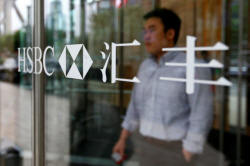|
Customers in short supply
at HSBC's Pearl River Delta branches, core of China plan
 Send a link to a friend
Send a link to a friend
 [April 27, 2017]
By James Pomfret, Lawrence White and Sumeet Chatterjee [April 27, 2017]
By James Pomfret, Lawrence White and Sumeet Chatterjee
DONGGUAN,
China/LONDON/HONG KONG (Reuters) - In the digital age, footfall in
bricks-and-mortar outlets is an incomplete measure of business activity,
but HSBC's <HSBA.L> sparsely attended branches in the Pearl River Delta
suggest it's not all plain sailing for the bank's expansion in mainland
China.
HSBC, the world's sixth-largest bank by assets, announced in 2015 that
it would hire 4,000 new staff and invest billions to make the Pearl
River Delta (PRD) its gateway to China, a retail and corporate banking
push that bet on a tech boom, infrastructure spending and a growing
middle class.
It is, as Chief Executive Stuart Gulliver reminded shareholders in Hong
Kong on Monday, a key plank of the bank's global strategy to improve
profits by focusing on markets with stronger economic growth. PRD
already generates more than 10 percent of China's GDP and over a quarter
of its exports.
On the ground, HSBC still has a mountain to climb.
In a rundown mall in Houjie, a factory town in the urban sprawl of
Dongguan, the HSBC branch stands out with its bright posters, colorful
pamphlets for credit cards and smiling receptionist, but only a handful
of customers an hour crossed the threshold during a Reuters visit last
week.

At the Industrial and Commercial Bank of China <601398.SS> (ICBC) branch
in nearby Changan, dozens rolled up in a similar period.
At a branch in a leafy district of Shenzhen, again HSBC was far quieter
than rivals China Merchants Bank <600036.SS> and China Construction Bank
<601939.SS>.
Some customers, like Way Zhi, a 28-year-old who helps run a family
trading business, welcome the peace -- you don't have to "waste a few
hours each time" like in local banks, he said -- but it is a reminder
that HSBC has some way to go to scale up.
Large local rivals in the PRD, most state-backed, each have more than
1,000 branches to HSBC's 114 including Guangdong, and they don't have
the headache of the tough compliance rules that HSBC has to follow to
safeguard its international business.
It's a headache the bank has to pass on to prospective customers.
A factory owner who gave his surname as Luo said he opened an HSBC
account last year to facilitate his business making wooden floorboards
and panels for clients in Hong Kong, where HSBC was founded in 1865.
Luo, who spoke to Reuters as he was leaving the Houjie branch,
represents the kind of affluent Chinese customer with business in Hong
Kong that the bank is keen to snag.
But opening a bank account was "quite a lot of trouble", he said, and
took nearly two weeks.
HSBC's customer-checking procedures have got tighter in recent years
after it was hit with billions of dollars in fines in the U.S. for
lapses in anti-money laundering controls.
A HSBC staff member at the branch, who declined to be named, confirmed
that customer background checks can take longer than at local banks that
have no or negligible U.S. business at risk and are not subject to
global regulatory scrutiny.

[to top of second column] |

A man walks past the
HSBC logo at the bank's new China headquarters in the Pudong
district of Shanghai September 29, 2010. REUTERS/Aly Song/File Photo

MAKING PROGRESS
HSBC says it is pleased with its progress in China. At the start of April it had
150,000 credit cards in circulation, having begun to issue them in December,
mostly after digital applications.
It has also launched online trading and banking over social media platform
WeChat.
"We do not intend to compete on a traditional basis in PRD. Absolute branch
numbers and footfall will not be our measure," said Kevin Martin, HSBC's Asia
Pacific head of retail banking and wealth management.
But
that's a game its big rivals are also playing; ICBC, for example, has offered
WeChat banking since 2013.
Since HSBC announced its strategy in June 2015, China's slowing growth and a
stock market crash have prompted a rethink on the pace of expansion.
CEO Gulliver said last year it would take on the 4,000 new regional hires over
five years, not three, as initially planned.
"Quite rightly, management felt at that time they didn't want to achieve the
strategy by taking on more risk," Sam Laidlaw, an independent board member at
HSBC, told Reuters.
Investors remain broadly positive.
"It's not an overnight thing, and of course everyone wants it to be faster. The
(China) strategy should be pursued – but it is only one of many strategies for
HSBC," said Hugh Young, Singapore-based fund manager at Aberdeen Asset
Management, HSBC's 6th-largest shareholder.
And
what figures the bank has disclosed for 2016 are encouraging, albeit from a low
base; it said in its annual report that its number of retail banking and wealth
management clients and its mortgage loan book in the area had both increased by
51 percent during the year.

But it also has some battles with red tape to win.
The lender is still waiting for approval for its securities business venture
with a state-owned fund in the PRD, more than a year after it announced the
partnership.
And some say the bank remains something of an outsider.
At the Ling Jia Property Agency, a few meters from HSBC's Houjie branch, realtor
Yi Linfeng said most of his customers use ICBC for mortgages. None, he says,
have ever used HSBC.
"I think they mostly have foreign customers from Taiwan and Hong Kong."
(Additional reporting by Carolyn Cohn in London; Editing by Will Waterman)
[© 2017 Thomson Reuters. All rights
reserved.] Copyright 2017 Reuters. All rights reserved. This material may not be published,
broadcast, rewritten or redistributed. |